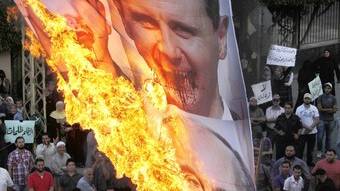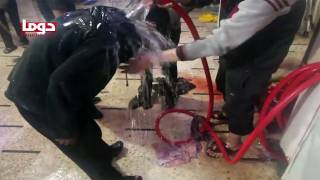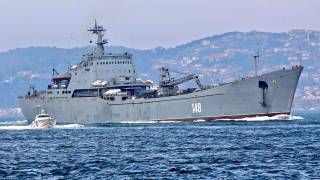Russia has doubts about Syria president’s ability to hold on
Source: latimes.com
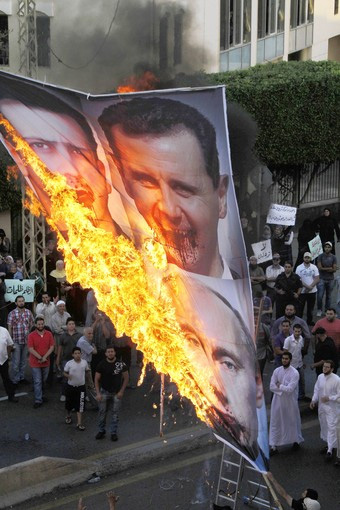 Protesters chant slogans against the Syrian regime and Russia’s support of President Bashar Assad as they burn a banner depicting Assad, top right, his brother, Maher Assad, and Russian President Vladimir Putin, bottom, in Sidon, Lebanon, last month. |
Even though Russia has been a close Syrian ally for decades, officials and analysts acknowledge that they have limited insight to Assad’s true situation and mind-set. Although some fear that Russia missed a chance to help find a solution to the conflict, now in its 17th month, others say that it never had that kind of clout.
Still, Moscow appears to have at least one more card to play: an offer of asylum if Assad chooses to ask for it.
The Kremlin quickly denied such a suggestion recently by its ambassador to France. But the comment was widely regarded as a trial balloon, and a Foreign Ministry official who spoke on condition of anonymity indicated that Russia could offer asylum if Assad requested it.
"In daily consultations, Assad keeps telling us he is still very much in control," the official said. "We are trying to ascertain for ourselves whether the point of no return has been reached, and frankly we are not so sure either way anymore."
The first sign that Russia is abandoning Assad would be a decision to evacuate its citizens, the official said, and that could soon be followed by the Syrian leader’s departure.
On Saturday, Foreign Minister Sergei Lavrov denied that any asylum plans were being made, telling journalists, "We are not even thinking about it."
Russia’s objections to the campaign to oust Assad have had little to do with loyalty to a longtime ally or unease over a loss of influence in the Middle East, analysts and officials said. Instead, the Kremlin fears what it sees as a broader pattern of the West using its political and military power to squeeze out leaders friendly to Moscow.
Russian President Vladimir Putin regards his country’s decision last year not to veto a U.N. Security Council resolution authorizing the use of force against Libya’s Moammar Kadafi as a serious mistake, analysts say. An air campaign led by the North Atlantic Treaty Organization was crucial for the rebels who captured and executed the longtime Libyan leader, and analysts say Russia got nothing for its cooperation.
"What Russia is really firmly against is the Libyan precedent becoming a norm, when everyone votes for some sanctions and then the most powerful military alliance steps into in a local conflict supporting one side in it and helping it win," said Fyodor Lukyanov, editor of the journal Russia in Global Affairs.
"The rebels should have been grateful to Russia, but the first thing they said after their victory and Kadafi’s murder was that Russian and Chinese companies are no longer welcome in Libya," he said.
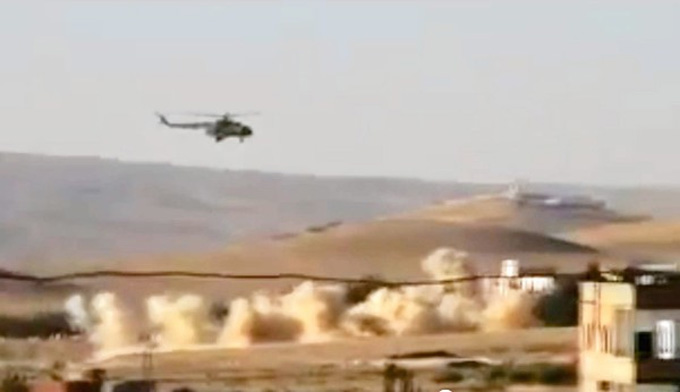
Lilia Shevtsova, a senior researcher with Moscow Carnegie Center, said Russia’s preoccupation with geopolitical concerns carried over to the Syrian conflict.
"Putin is very much inclined to see status quo preserved by any means in Russia and in any regime which he considers friendly," she said.
She said that she doubts the Kremlin has any real influence left over the situation in Syria, and that by continuing to publicly back Assad, Russia has helped the U.S. and its allies obscure the fact that they have no workable plan for Syria. In contrast to Libya, U.S. and other Western officials have consistently ruled out military intervention.
Russia maintains a naval base in Syria, one of its few military bases aboard, and several thousand Russian diplomats and technical specialists working with Syrian companies are based there, said Gennady Gudkov, deputy head of the security committee of the State Duma, the lower house of Russia’s parliament.
"I am afraid we must have missed our chance to talk Assad into some constitutional reform, even including him ceding power," Gudkov said. "The Kremlin’s persistence in defending his regime now comes from the fact that there is no good way out of the situation and no good decision anymore."
Leonid Kalashnikov, deputy head of the Duma’s foreign affairs committee, said that, aside from some weapons sales, Russia has not had close political or economic ties to Syria for years, a reflection of Moscow’s diminished role in the region.
"That is why it would be wrong to consider Syria the last Russian stronghold in the Middle East; in fact, we no longer have any," he said.
"Russia just wants to make it a hard and fast rule that all such conflict issues should be resolved only through efforts of the existing international institutions," he said.
Source: latimes.com
